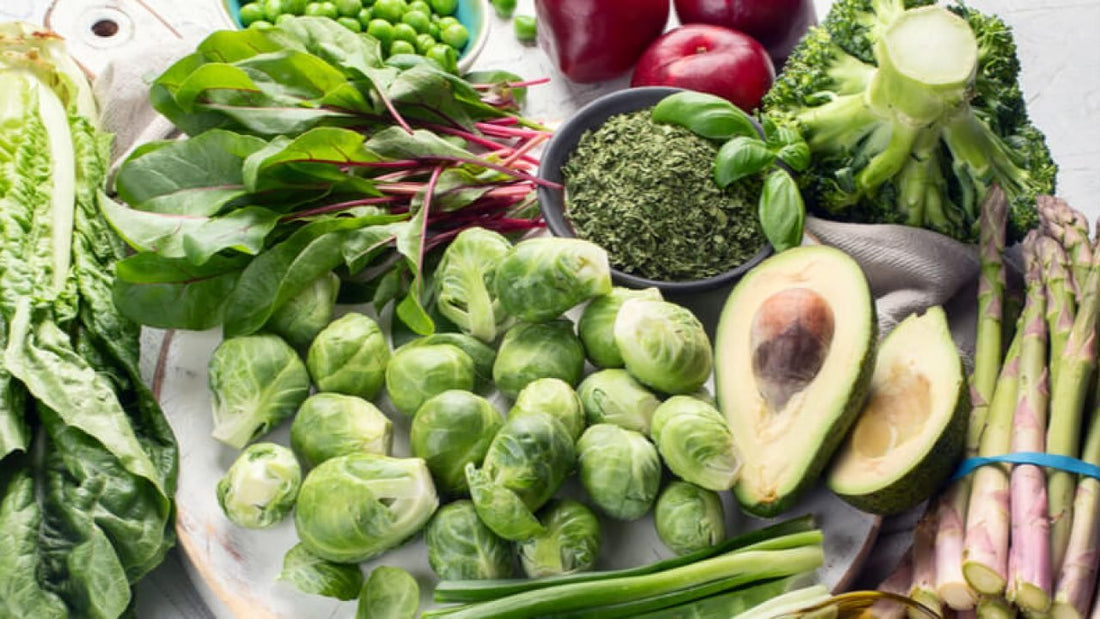
All you need to know about Vitamin K
Share
What is special about vitamin K?
Vitamin K is an essential vitamin needed by the body for blood clotting, bone building, and other important processes. It's found in leafy green vegetables, broccoli, and Brussels sprouts.
What you will learn from this article
- What is vitamin K?
- What are the functions of vitamin K?
- How much vitamin K do I need per day?
- What foods contain vitamin K?
- Does vitamin K interact with other nutrients?
- What happens if you don't have enough vitamin K?
- What happens if you have too much vitamin K?
- When should I pay extra attention to my vitamin K intake?
What is vitamin K?
Vitamin K is a fat-soluble vitamin that has three forms: vitamin K1, K2 and K3.
Vitamin K1, also known as phylloquinone, is quite abundant in foods and we can find it mainly in plants.
Vitamin K2, also known as menaquinones, is produced by bacteria and yeast and we can find it mainly in animal products such as meat, cheese and eggs.
Vitamin K3, also known as menadione, is the synthetic form of the vitamin and can only be found in supplements.
What are the functions of vitamin K?
Vitamin is a key protagonist in every bleeding wound! The K in vitamin K comes from the German word “koagulation”, which means blood clotting, or coagulation.
Vitamin K is involved in many bodily functions. Our bodies use vitamin K to form key proteins that form and maintain the structure of our bones.

How much vitamin K do I need per day?
How much vitamin K you need per day changes according to your age, sex and life-stage but here is a general orientation.
As per the guidelines set by the National Academy of Science Food and Nutrition Board, a daily vitamin K intake of at least 120 μg for men and 90 μg for women is necessary either through dietary sources or oral supplementation to address vitamin K deficiency in adults. The recommended corrective oral dose for vitamin K1 deficiency ranges from 1 to 2 mg, with a maximum oral dose of 25 mg.
We can get enough vitamin K from our diets by eating a variety of foods. A healthy and balanced diet with the following Real Foods will help you meet your needs for vitamin K.

* These values are based on the adequate intake (AI) estimates from the European Food Safety Authority (EFSA). They should not be interpreted as nutrient goals.
Which foods contain vitamin K?
We can find the two natural forms of vitamin K in plants or animal-based foods.
Foods rich in vitamin K include:
- dark green leafy vegetables (such as spinach, lettuce, cabbage, kale, Brussels sprouts, broccoli and cauliflower)
- some seed and vegetable oils (such as soybean, rapeseed, and olive oil)
- Avocados
- meat and poultry
- cheese and other dairy products

Does vitamin K interact with other nutrients?
Vitamin K interacts with vitamin D to maintain good levels of calcium in our bones, which is why we need a good balance of all these micronutrients to keep optimal bone growth and health.
In turn, excessive intakes of vitamin E can lower levels of vitamin K, by causing our bodies to break down vitamin K. This is particularly harmful to people who already have low levels of vitamin K (for example, due to specific health conditions or the use of anticoagulants), as it can impair normal blood clotting and increase the risk of bleeding.
Vitamin K is often better absorbed when combined with foods that contain fats. For example, pairing cooked vegetables with healthy fats, can help our bodies absorb up to three times more vitamin K.
What happens if you don't have enough vitamin K?
Several vitamin K-dependent proteins are involved in essential processes such as blood clotting, bone metabolism, and cardiovascular health. Vitamin K deficiency can contribute to significant bleeding, poor bone development, osteoporosis, and increased cardiovascular disease.
What happens if you have too much vitamin K?
Too much Vitamin K from foods is not considered a threat, since it’s unlikely that we get too much of it through our diets alone.
Excessive intakes of vitamin K are mainly concerning to those who are taking anticoagulants or other medicines that affect the production of clotting proteins. High doses of vitamin K (from the diet or supplements) can block the anticoagulant effects from the medication and risk the thickening of the blood, which can have serious health consequences.
When should I pay extra attention to my vitamin K intake?
Under normal circumstances Vitamin K deficiency is not at risk if you consume the above recommended foods as a part of a varied and balanced real food diet.
content source:
The European Food Information Council (EUFIC)

